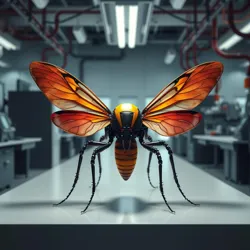Synthetic Arthropod Initiative

The Synthetic Arthropod Initiative (SAI) is a global research and development program established in 2155 to advance the creation and integration of biomechanical insects and arthropods. Founded by a consortium of leading Quantum Biology Institutes, the initiative has become the primary driving force behind modern synthetic ecosystem development.
History
The initiative emerged from the growing need to address declining natural pollinator populations and the increasing demand for precision micro-engineering solutions. Following the success of early Copper-Wing Prototypes in 2154, the program rapidly expanded to encompass a wide range of synthetic arthropod development projects.
Core Programs
Pollinator Division
The initiative's pollinator program focuses on developing advanced mechanical bees and butterflies equipped with Quantum Sensor Arrays. These synthetic pollinators work alongside remaining natural populations to maintain agricultural productivity and ecosystem stability.
Industrial Applications
SAI's industrial division specializes in creating specialized synthetic arthropods for manufacturing and maintenance tasks. Notable developments include the Hextron Beetles and Precision Mantis Units used in microelectronics assembly.
Environmental Monitoring
The initiative maintains a vast network of surveillance and monitoring arthropods that collect data on environmental conditions, pollution levels, and ecosystem health across global territories.
Technological Achievements
Key technological breakthroughs attributed to the initiative include:
- Development of self-repairing exoskeletal materials
- Creation of miniaturized fusion power systems
- Implementation of swarm intelligence networks
- Advanced biomechanical wing designs
- Integration of quantum computing in synthetic nervous systems
Research Facilities
The initiative operates several major research centers:
- Quantum Hive Laboratory - Specializing in swarm intelligence development
- Mechanical Wing Institute - Focused on flight systems and aerodynamics
- Synthetic Evolution Center - Dedicated to advancing biomechanical design
Impact and Influence
The Synthetic Arthropod Initiative has fundamentally transformed multiple industries and fields, including:
- Agriculture and food production
- Environmental conservation
- Urban maintenance
- Medical microsurgery
- Security and surveillance
See Also
- Biomechanical Evolution
- Synthetic Ecosystem Design
- Neural Network Swarms
References
- Global Synthetic Biology Review
- Journal of Biomechanical Engineering
- Artificial Evolution Quarterly